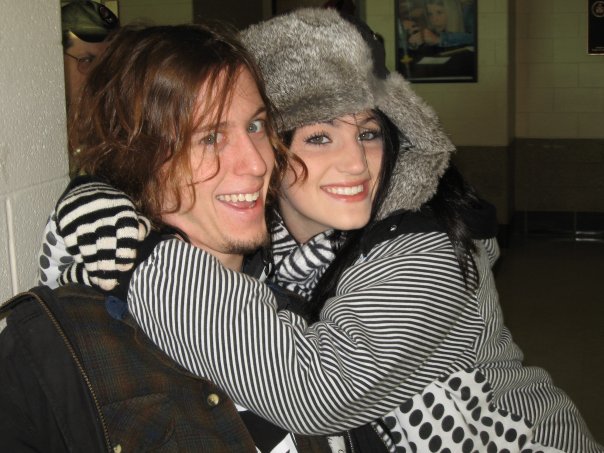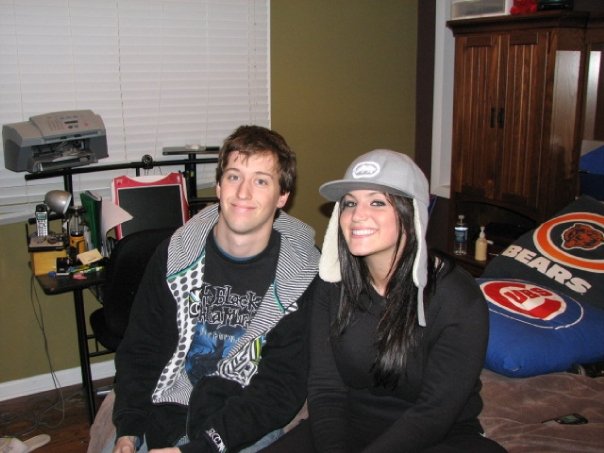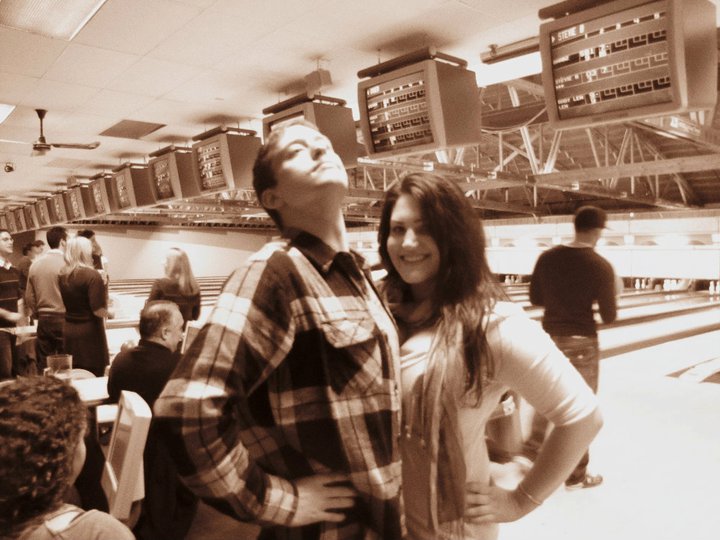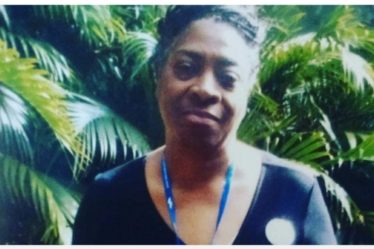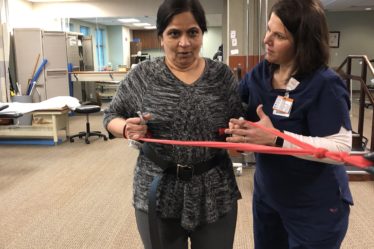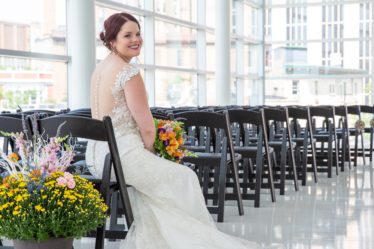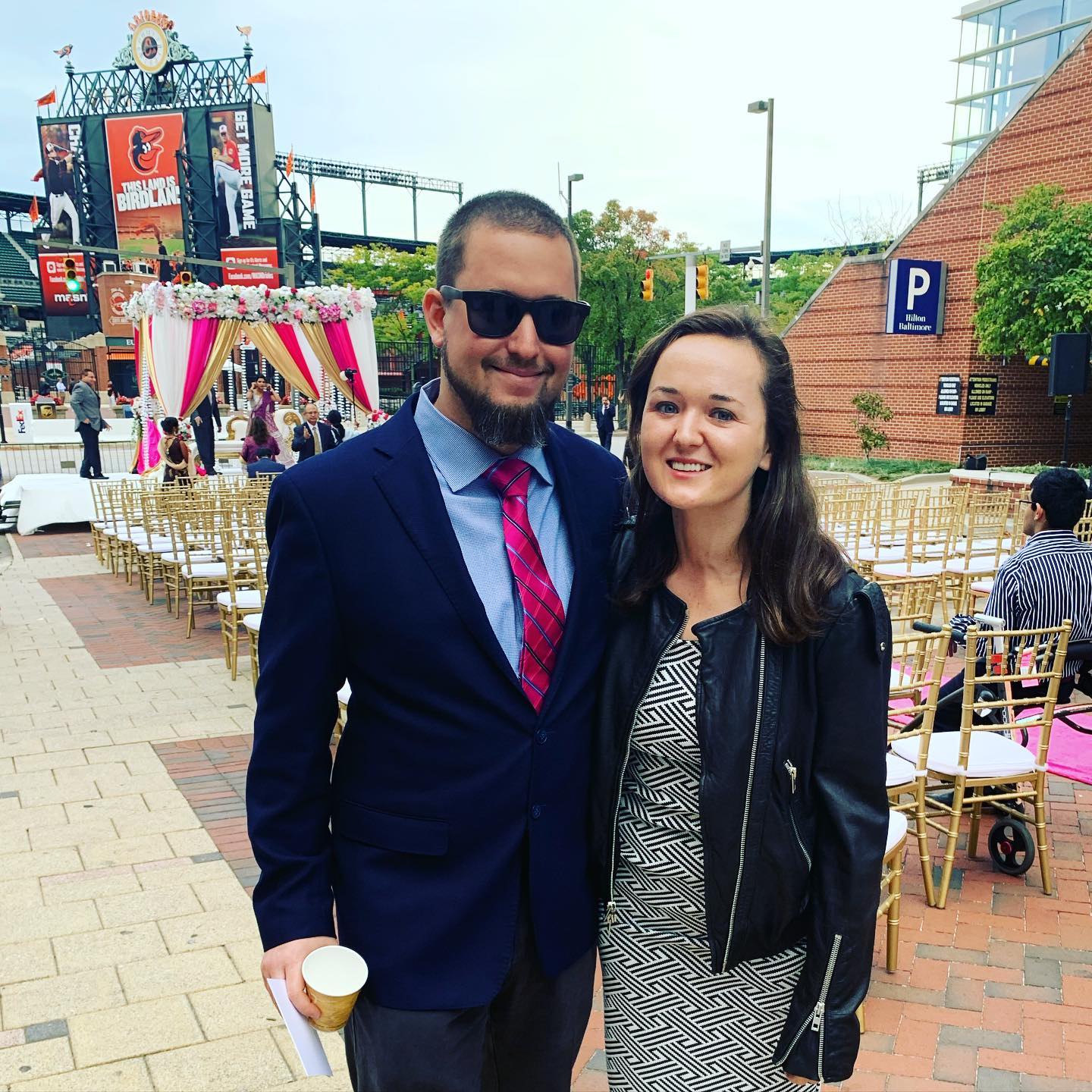
An interview with Hunter Starr, a childhood cancer survivor.
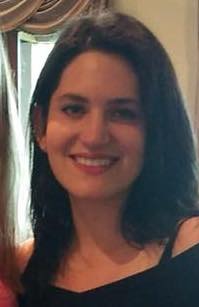
By Jenna Lindman
I have been friends with Hunter Starr for over 15 years. Hunter and I first met in middle school in seventh grade. His locker was next to mine and I always thought of him as the cool skater kid. Hunter and I truly started becoming friends in high school. We spent a lot of time together and even worked together at the Silverado Grill in Elmhurst, IL. Hunter became a part of our family; he spent eight Thanksgivings in a row eating dinner and then going bowling with us. The truth is, I always admired Hunter. He has always been able to make me laugh with his sarcasm and quick wit, but more than that Hunter had survived something that at the time I couldn’t imagine surviving; Hunter had beaten liver cancer as a child. When the day came that I told Hunter about my own cancer diagnosis, he was there for me. Hunter even came with me to one of my chemo infusions. It was a great comfort knowing that he had been where I was and survived. I’d like to thank Hunter for all of his support. I am honored that he sat down with me to discuss his journey with pediatric cancer.
Hunter, tell us a little about yourself.
My name is Hunter Starr. I lived most of my life in Elmhurst Illinois where I attended York high School and graduated in 2007. I am 30 years old and I work as a laboratory technician for a forensic engineering company in Austin Texas. I studied geology at Western Illinois University.
Sounds like a cool career you’ve got! Hunter, I have known you for a long time now and a big part of the things I know about you is that you are a childhood cancer survivor. When were you diagnosed with cancer?
I was diagnosed in the fall of 1995. I was six and I was in the first grade.
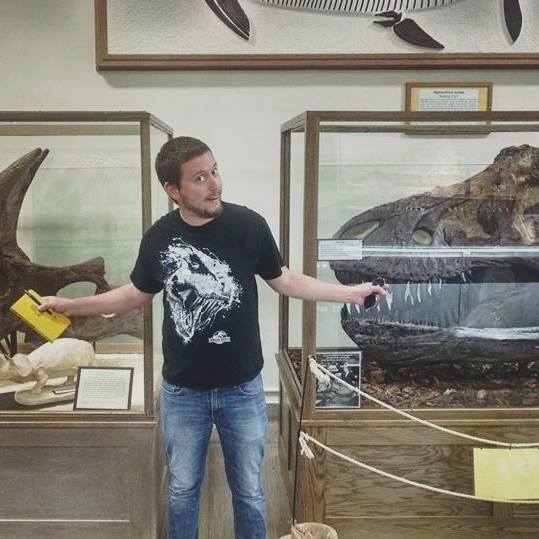
How were you diagnosed?
I was not feeling well. I woke up that morning with a pain in my neck. I told my mother I did not want to go to school and I wanted to stay home. My mother said, “no you don’t have a fever you’re going to school.” I got on the bus and, to my understanding, I vomited on the bus. As soon as I got to school they took me to the nurses office and I was sent home. When my father came home he took me to Elmhurst hospital. There, I had an x-ray and noticed my liver was internally bleeding. I was immediately sent to Rush hospital in Downtown Chicago where they did emergency surgery on me. Then they diagnosed me with hepatocellular carcinoma, there was a golf ball-sized tumor growing on my liver.
Prior to this incident at school did you have any symptoms that you remember?
No, there were no symptoms leading up to this.
When you got diagnosed, what was your treatment plan like?
I was in a medicated coma for about a month. I came-to around Christmas. I woke up with a feeding tube in place, which they removed a few days later. I stayed at the hospital and did physical therapy after being bedridden for a month. Following that was about a six-month round of chemotherapy to make sure that the cancer was fully out of my system. After that I had a portacath put in, which is a direct line for blood work. Blood work and scans were done first monthly, then yearly to biyearly. I think my last remission scan was in 2005, 2006.
So you were so young when you got cancer, did you really understand what was going on?
Yes and no. It’s actually really weird how much I picked up from my doctors; they were honest and straightforward and talked to me about my low platelet counts. I was very interested in what was happening to my body, and that’s something to this day I enjoy learning about – the human body. So, that’s the fun part of the [crappy] act of going through cancer treatment.
Do you remember being scared?
I was very fearful. I don’t really know how to explain the symptoms that I felt. You’re so young and your mortality is being shown. I understood I could die. Knowing that other people don’t get through this was something I understood early on. I think that’s one of those things to that effects different people in different ways. I think I had a cynical adaptation to it, a sort of comedy – laughing at things that scare you. That was my coping mechanism, I guess.
Was there anything as a kid that made you feel better?
My family, they got me through the most difficult times. I remember going through chemo and having my brothers come and see me. They were afraid because they understood the implications and they were younger than me. My grandmother, my father, and my mother were coming to the hospital. It was really just my family. Also, the community came together. I know that people in the Elmhurst community donated time and meals to my family while I was sick. I was aware of those things as a kid. Those were the real positives.
The thing that I cared about the most was my cat, Meowser. I was upset that my dad couldn’t bring my cat to the hospital. They would buy me stuffed animals, Beanie Babies to have in the bed. I had a lot of stuffed animals during chemo because I couldn’t have my cat in the hospital, haha. Coming home that was the thing I was most excited about: my cat, my brothers, and my family.
What was it like going back to school?
This is also where I think I became cynical. It was obvious the school was doing everything they could to integrate me, show the other kids, “hey this is what’s happening, this is why Hunter is bald and sickly looking.” I remember that there were kids who were kind, kids that were scared, and kids that were just mean. There were kids that thought it was funny. There was bullying that I remember in the first and second grade. I always remembered that, it was ingrained in me. You don’t think that of kids, but kids can be unkind.
There were also kids that didn’t treat me any differently, or at least tried not to. It wasn’t until I went somewhere like Camp One Step*. At camp, I was around a bunch of kids going through the same thing and that was where I truly realized that cancer is not a defining part of me. No one was judging or treating me any differently because they are all going through the same thing.
Did anything change about your life after cancer?
That’s hard for me to say because I was so young. The biggest thing was that I was sickly and nonathletic. I liked things like soccer and I remember my teammates being antagonistic towards me and I quit. I moved away from anything that was team sport-related. I found swimming which was more individualistic and I started regaining my strength through that. I did swimming from second grade until sixth grade. I liked it because I didn’t really care about the competition that much, I just did it. I never wanted to do anything involving competition that required you to work with people, I think. That’s what helped me find skateboarding later because that was individualistic as well.
Do you think cancer has impacted your identity?
Yes, but [growing up] I didn’t know if I wanted it to be my defining characteristic. It did give me an interest in the natural world. It got me interested in the healthcare profession; I considered going into healthcare – I didn’t not follow that path but it impacted my long road to my bachelors degree. I minored in functional morphology and evolutionary anatomy; I got to learn about anatomy, biology, and botany. I really enjoyed meeting all the people that do go into medicine and healthcare that volunteer at One Step, which I volunteer for. I am empathetic toward people who are going through medical conditions that they have no control over. Cancer can just arise, it is a natural process that can be environmental and it can also be caused by your genetics. And that’s the thing with my cancer, it was most likely a genetic flaw. It’s humbling, I think. It makes you realize you should be thankful for what you have.
How long have you been working with OneStep?
Since 2011 I have tried to make one camp per year, they have a winter and summer camp. Last year I got to assist with their Utah ski trip, in which they brought a select group of kids to fly out to Park City Utah and work with the Ability Center to get kids with disabilities skiing using adaptive equipment. That was great. They offer a lot of different trips for things like that. They do a DC trip that is very cool. It teaches the kids to be proactive in politics about their disease. There’s a dude ranch camp and they started doing a Chicago day trip camp and a family brain tumor camp.
So, you recommend them to any families or kid that’s facing this.
Yeah, and I try to talk about them as much as I can. It’s a great group that runs it.
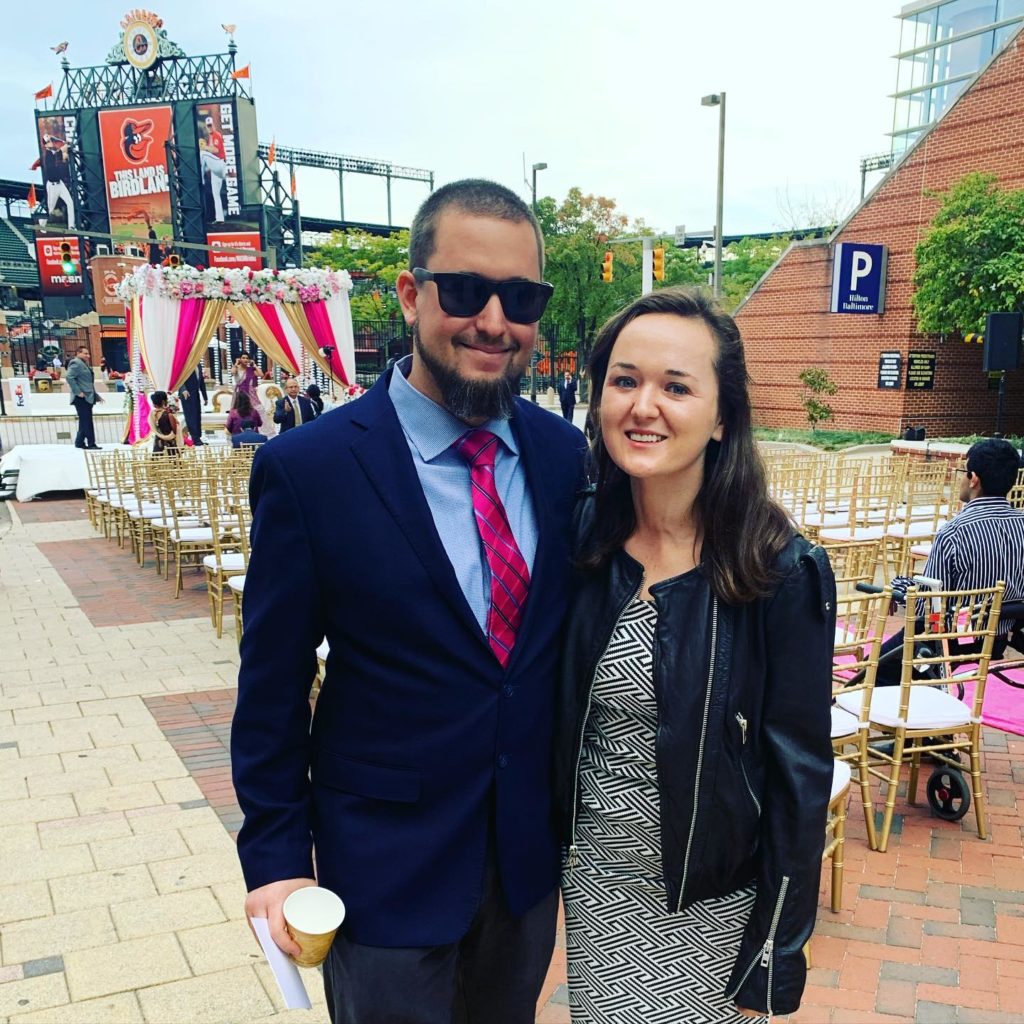
What was it like for your parents and family that you remember?
Not good! My parents were going through a divorce and dealing with a close-to-death child. It was kind of the worst thing you could think of. It was hard. I give a lot of credit to them going through that at the same time. And my brothers were very much affected by those things happening at the same time. They persevered through it, they were strong.
What do you think is different about being a childhood cancer survivor vs an adult cancer survivor?
Childhood cancer forces you to mature much faster in some regards. Childhood cancer forces you to realize that life can be very short and at a young age and that can do different things for different people. For me, I never want to be too serious; I try to have a lighthearted view on life. I think it leads a lot of people I know to be more compassionate and to treat people with more respect because they recognize the bad things that people could be going through.
In talking with other cancer survivors I hear a lot of people speak about a silver lining that they found with their battle with cancer. Do you have a silver lining with your experience with cancer?
I think my silver lining really is that I’ve gotten to make great relationships with people. I go back to camp, it is something that I think got me through a lot of stuff in childhood and then adulthood. I came back as a counselor for OneStep in 2011 and got to work with people who had me as a camper. I’ve gotten to learn from them and I’ve gotten to work with some great kids who are going through cancer. I feel grateful for that group of people. It’s a humbling thing. It makes you grateful for what you have, which is life cause, you know that it’s finite.
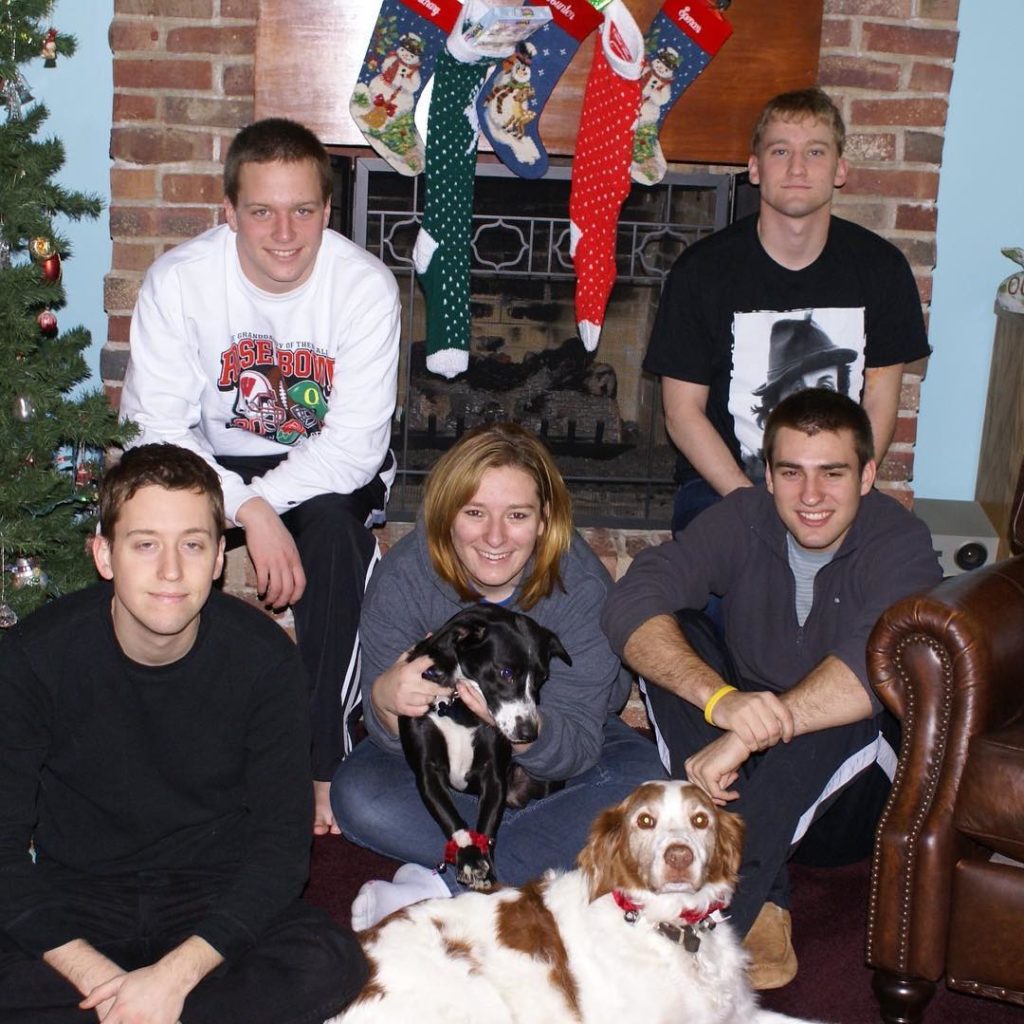
If someone you knew had a kid who was diagnosed with cancer, what would you want the family or the kid to know?
I think the biggest advice I’d have is that everyone around you has your best interest in mind. Your family cares about you and letting that kid know that the people around them care and they will get through this. They have a support network. That’s what I’d want them to know. There’s no sugar coating it: cancer is not easy, it’s scary but they’re not alone. That’s what I’d want them to know.
Is there anything else we should know about your or your experience?
My plug for Onestep is heavy here. They are a great organization and I love being a part of it.
Everyone has their own way of going through their “cancer journey.” It’s interesting to hear everyone’s stories and everyone’s thoughts. What I love about people’s stories is how they find optimism in it because I found a lot of pessimism from it for a long time but now I feel like there’s an ebb and flow to it. But I’m happy to see people being on the optimistic side.
Do you face any side effects now or did you have any long-lingering side effects growing up?
It’s unknown, but possibly internal stomach and digestive issues. But I’m 30 and I’m starting to realize that maybe I need to take more care and eat better. I do think that compared to classmates and my brothers I was not as big, I don’t know if that’s just my genetics or if cancer was involved.
Maybe ADHD which I didn’t get diagnosed with until I was 21. My family didn’t want me to be treated any more differently than I already was, so they didn’t seek treatment for ADHD even though I showed signs of being a hyperactive kid. So, cancer affected me in that way: my parents didn’t want me to be treated as different, even though I went through life always being treated as a little different.
Is there anything else that we didn’t cover that you think is important?
I think my biggest takeaway is that both Michael (my fiance) and I talk about cancer and have a grounded attitude about it. The biggest thing to discuss with your group or network is that developing a community out of cancer is very important. Communities can help you through these things very well. Positive outreach, or I think of Imerman Angels and groups like that. You may feel isolated going through something like this. You may feel like you just want to be in your own head-space and I think that’s okay. In hindsight, I believe looking for that community is important. I appreciate things like that. I appreciate your outreach and I’m happy to be a part of this.
Thank you Hunter! I am honored that you’re a part of it.
Camp One Step is a camp dedicated to supporting child cancer fighters and their families. If you are interested in learning more about the services One Step provides please visit their website at https://camponestep.org/
